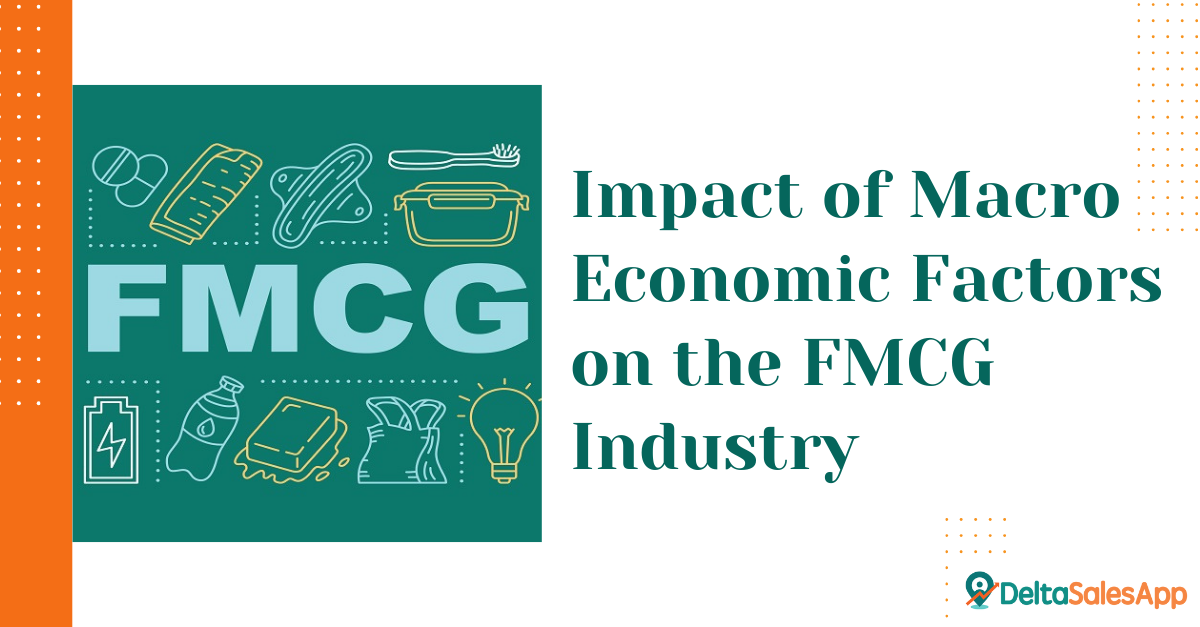Impact of Macro Economic Factors on the FMCG Industry

In the fast-paced world of Fast-Moving Consumer Goods (FMCG), businesses must be aware of various macro economic factors that influence their operations, product pricing, and sales performance. These factors not only shape the market landscape but also impact decision-making at every level, from manufacturing costs to consumer purchasing behavior. Let's dive deeper into how these macroeconomic conditions affect the FMCG industry and how businesses can adapt to stay ahead.
What Are Macro Economic Factors?
Macroeconomic factors are broader economic elements that affect the overall economic environment. These include inflation, interest rates, employment rates, taxation policies, exchange rates, and consumer confidence. While each of these factors has a significant impact on all industries, they are particularly important for the FMCG sector, which deals with consumer goods that are sold quickly and at a relatively low cost.
Key Macroeconomic Factors Affecting the FMCG Sector
- Inflation and Raw Material Costs
Inflation is one of the most critical macroeconomic factors influencing FMCG businesses. When inflation rises, the cost of raw materials such as sugar, oil, and packaging materials also increases. Since these materials are essential for FMCG manufacturing, rising raw material costs often lead to higher production costs. For businesses, this means either adjusting the price of products or absorbing the increased cost, which can impact profitability.
- Consumer Confidence and Spending Power
Consumer confidence is a direct reflection of how individuals feel about their financial future and the economy as a whole. When consumers are confident, they are more likely to spend money on non-essential items, driving demand for FMCG products. However, during periods of economic uncertainty, such as during a recession or high unemployment, consumers may cut back on discretionary spending. In such times, businesses may see a dip in sales, particularly for premium or luxury FMCG products.
- Interest Rates and Disposable Income
The rate at which banks lend money also affects the purchasing behavior of consumers. When interest rates are high, it becomes more expensive for consumers to borrow money, which may reduce their disposable income. As a result, FMCG companies may experience lower demand for their products. On the other hand, when interest rates are low, consumers may have more disposable income, potentially boosting sales for FMCG businesses.
- Taxation and Government Policies
Changes in tax policies can have a profound impact on the FMCG industry. For instance, an increase in excise duties or VAT (Value Added Tax) on certain products may lead to higher product prices. This, in turn, can reduce demand for these goods. Additionally, government subsidies or incentives aimed at specific sectors or industries can also provide opportunities for FMCG companies to reduce costs or introduce new products in the market.
- Global Economic Conditions and Exchange Rates
Since the FMCG sector is highly dependent on the global supply chain, changes in exchange rates and international economic conditions can significantly affect costs and operations. A fluctuating exchange rate can make imported raw materials more expensive or cheaper, influencing product pricing. Similarly, global economic trends—such as recessions or booms in key markets—can either drive demand for certain products or reduce market potential.
Adapting to Macroeconomic Changes: Strategies for FMCG Companies
Given the impact of macroeconomic factors, FMCG businesses need to be agile and adapt their strategies to mitigate risks and leverage opportunities:
- Cost Management and Efficiency
One of the most important responses to rising costs, especially due to inflation or increased raw material prices, is improving operational efficiency. By optimizing the supply chain, reducing waste, and renegotiating supplier contracts, companies can better manage rising costs without significantly increasing product prices.
- Strategic Pricing
Pricing strategy becomes especially important during periods of inflation or rising raw material costs. Companies should conduct regular market research to understand price elasticity and consumer purchasing behavior. Offering promotions, discounts, or bundling products together can help maintain demand even when costs increase.
- Diversification of Products and Markets
In an uncertain economic environment, businesses that diversify their product range or target market are better positioned to weather economic fluctuations. Expanding into new geographical regions or launching new product lines tailored to the economic climate can help spread risk and boost revenue.
- Focus on Consumer Needs and Innovation
During tough economic times, consumers become more price-sensitive. FMCG companies can focus on value-based marketing and ensure that their products meet the evolving needs of the market. Innovations in packaging, formulation, or offering smaller, more affordable sizes can help retain customer loyalty.
- Technology and Digital Transformation
Technology can help FMCG businesses reduce costs, improve supply chain management, and reach new customers. Digital platforms allow businesses to engage with consumers directly, gather feedback, and promote their products more efficiently. Companies that embrace digital transformation are more likely to thrive in a competitive market.
Conclusion
Macro economic factors are a crucial element of any FMCG strategy. From raw material costs to consumer confidence, these factors directly influence how businesses operate, price their products, and engage with consumers. By staying informed about economic trends and adjusting their strategies accordingly, FMCG companies can navigate through challenging economic times, maintain profitability, and continue to grow.
Understanding and responding to macroeconomic conditions is key to long-term success in the FMCG industry. By focusing on cost management, strategic pricing, market diversification, and innovation, companies can maintain strong market performance regardless of external economic pressures.









